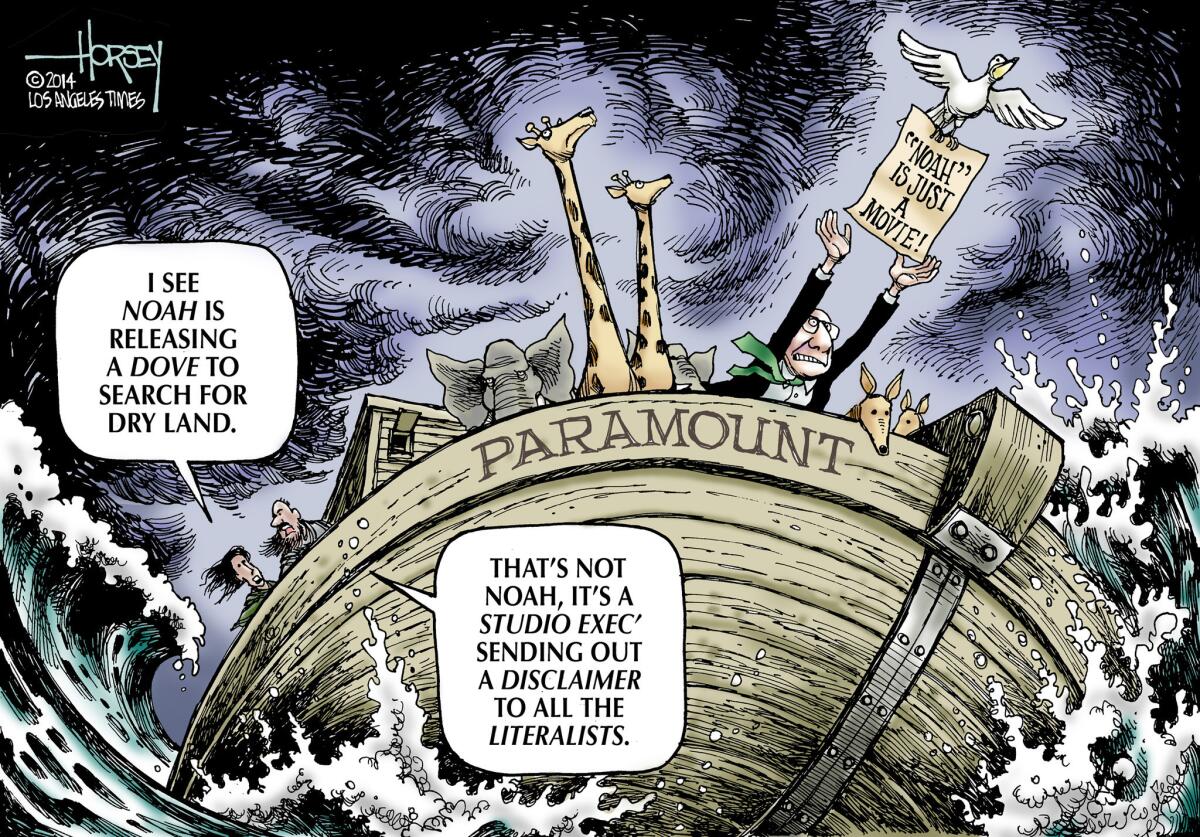A flood of reaction to ‘Noah’

Until film director Darren Aronofsky got his hands on it, the old tale of Noah’s Ark had devolved into a cute children’s fable of giraffes and elephants and bears and bunnies crowding onto a big boat.
Aronofsky has re-envisioned it as what it really has always been: an apocalyptic, end-of-the-world disaster story. Biblical literalists, though, are not entirely happy about this new telling of one of the most ancient stories in the Judeo-Christian tradition.
Aronofsky’s “Noah” opens Friday in theaters across the country and the big question for Paramount, the studio that paid more than $130 million to produce the film, is whether the large Christian audience that showed up for Mel Gibson’s “The Passion of the Christ” and the more recent “Son of God” will pay to see what Aronofsky has called “the least biblical film ever made.”
If Glenn Beck has his way, no right thinking person will go see the movie. The eccentric conservative TV and radio commentator has told his followers, “I hope that ‘Noah’ is a massive failure.” Without actually viewing the film, Beck has dismissed it as two hours of “dangerous disinformation” that portrays Noah as a drunk with an environmentalist agenda.
Other religious conservatives, however, have expressed a distinctly different opinion of the film. Among them is Jim Daly, president of Focus on the Family, who previewed “Noah” and gave credit to Aronofsky for telling a compelling story. “It is a creative interpretation of the scriptural account that allows us to imagine the deep struggles Noah may have wrestled with as he answered God’s call on his life,” Daly said.
On Wednesday night I went to a screening at Paramount Studios in Hollywood to see “Noah” for myself. I followed it up by rereading the story of Noah and the flood in Genesis. The contrasts between the two versions are stark.
PHOTOS: Biggest box-office flops of 2013
The story in the Bible is brief — not much longer than a pitch for a disaster movie — and Noah doesn’t have a word of dialogue until after the waters have receded and his sons find him drunk and naked in his hut. Aronofsky bulks up the sketchy tale, turning it into a cross between “Game of Thrones” and “Waiting for Godot,” with some antediluvian “Transformers” thrown in as ark builders.
Arguably, God comes off better in the film than in the book. In the Bible, just 10 generations into his creation, the Big Guy is not happy with the sinful ways of human beings. He wants a redo, so he drowns everybody but Noah and his family. Then, sounding a little regretful — “Oops! My bad,” sayeth the Lord — God promises Noah he won’t do it again, even though he knows Humanity 2.0 will be just as awful as the first version.
Aronofsky’s movie keeps God off in the clouds and lays the heavy choices on Noah while graphically portraying the wickedness and violence of those early humans. You can see why they kind of had it coming. Besides their murderous ways, they were a bunch of polluters who didn’t recycle and ate way too much red meat.
ON LOCATION: Where the cameras roll
The richest part of the film version, though, is the way Aronofsky gives depth and dimension to Noah and his family and the existential issues they face. Yes, he takes great liberties with the details, but, for any Christians interested in something more intellectually rigorous than old fables, Aronofsky’s “Noah” would be a great starting point for a Bible class discussion about justice, mercy, faith and obedience.
Paramount may have less trouble than expected attracting a Christian audience already intrigued by the second story in the Bible. The tougher sell might be to a general audience unaccustomed to having their disaster flicks served up with such a grim and challenging vision.
ALSO:
Horsey on Hollywood: The Grammys
Horsey on Hollywood: Bro Country Music
Horsey on Hollywood: CNN’s news without news
More to Read
From the Oscars to the Emmys.
Get the Envelope newsletter for exclusive awards season coverage, behind-the-scenes stories from the Envelope podcast and columnist Glenn Whipp’s must-read analysis.
You may occasionally receive promotional content from the Los Angeles Times.










